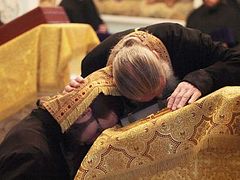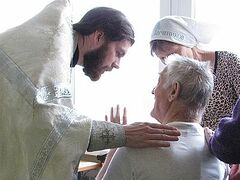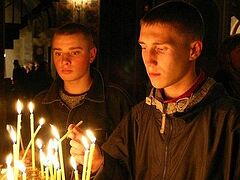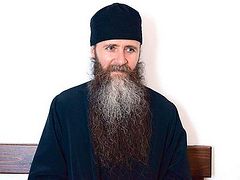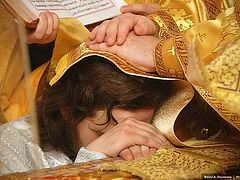The recently reposed, venerable Archpriest Nicholai Vedernikov talks about famous and remarkable people he knew personally in the Soviet music world as well as in the Russian Orthodox Church of the Soviet era, about Patriachs Sergiy and Alexy I, the upbringing of chidren, and life after death.
Wonderful people I’ve met
 Archpriest Nicholai Vedernikov and Matushka Nina Arkadievna.
Archpriest Nicholai Vedernikov and Matushka Nina Arkadievna.
But she [his wife] was a sickly person, and that was a big cross for me. She was terminally ill—she didn’t have cancer, but a heart condition with which people do not live long. Nonetheless, I looked after her health and she lived until she was seventy-six years old. Her health was a very big cross for me. She was a wonderful composer; in the conservatory they wanted to keep her as a concertmaster. But because of her high blood pressure and that heart condition she could not perform, could not work to the full. That is why when Alexander Vasilevich Sveshnikov asked her: “Why are you leaving us? Perhaps because your husband is a priest?” she replied: “No, not at all because of that. It is because of my health condition”. So she had to leave that place.
She accompanied in the tutor group of Nina Lvovna Dorliac and overall was a wonderful musician, but sadly her health didn’t allow her to take part in performances. The state of her nervous system did not allow her to make such things a reality.
I served the funeral service for great people who have died, such as Svyatoslav Richter. I held his funeral service in our Church of John the Soldier. Then I served the funeral service of a very wonderful composer, Alfred Schnittke, also in the same church. I said some appropriate words during the funeral services of both Richter and Schnittkes. Later I held the funeral service for Nina Lvovna Dorliac as well.
Unfortunately, I didn’t have a personal connection with Vladimir Vladimirovich Sofronitsky, but with his relatives—through his friend. I had relationship in the sense of providing them with spiritual guidance. Three of Sofronitsky’s siblings used to confess to me in Leningrad: I travelled there especially for that so that they could confess, I gave them spiritual guidance. Later I did that for his son too, the deceased Alexander Vladimirovich. Now only his daughter-in-law remains alive (she is ninety years old). Thus I didn’t know Sofronitsky personally, but his relatives—a brother and two sisters—I knew well. I knew the two daughters of the composer Scriabin. I had an opportunity to give them Holy Communion and hold their funeral services… Such relations I had with these composers.
—So it turns out that even during Soviet times there indeed had been Orthodox, spiritual personalities amongst the composers and the people of high culture?
—Of course, those were some wonderful people I had the chance to meet. Now every year I serve a memorial service for the great composer Maria Veniaminovna Yudina. Unfortunately, I was not so fortunate as to be taught by her, but she was the greatest personality, an outstanding person, a ingenius composer. She wasn't just a musician, but an overall titan, Maria Veniaminovna Yudina. Now her student is writing a book about her and it is called “The religious destiny of Maria Veniaminovna Yudina”. She was truly an ascetic of piety who was never afraid of anything. Even in the most difficult times she was a confessor of the faith, and not only did she not hide her faith, but on the contrary, she proclaimed it openly in various ways! She recited poems of forbidden poets, was friends with Pasternak, etc. But this is an altogether different conversation in itself; now I won’t touch on this theme. Every year beginning from at least I believe 1970s (she reposed in 1970), I serve a Pannikida for her in the Church of John the Soldier and afterwards always say a few words. These words are written down in the memoir books about her. Of course, you cannot avoid talking about Yudina concerning everything that has to do with music and culture. She was an outstanding person.
—You mentioned that Yudina was friends with Pasternak. Was he a religious person?
—Of course he was and he was a wonderful personality. Pasternak was Maria's friend; she always held gatherings at which his works were read.
I myself was not friends with Pasternak, naturally; but when he was well his son would come to us for the memorial services. I don’t know how he is doing now. All the painters came to the memorial services on 19th of November every year, all of Maria Veniaminovna’s former friends.
On November 19 in our Church of John the Soldier I always serve the memorial service for Maria Veniaminovna Yudina.
Although like many people back then, she didn’t recognize Patriarch Sergiy (Stragorodskiy). That was because of his move towards the Soviet government, in the sense that he declared peace with the Soviet leadership. But his way of treating our enemies is precisely how he saved the Church, do you understand? He undertook such tactics, which in fact led to the rescuing of the Church. It was his “Declaration” of 1927.[1] Before that, many people left him, including Maria Veniaminovna. Many misunderstood him for it. She once told me, “We won’t be able to remain friends because you are ‘Sergiy’s’!” Truly, I loved Patriarch Sergiy and even ministered to him; I knew his cell attendant very well—the future Metropolitan John. Yet at the same time, we couldn’t have been any closer with Yudina than we already were. Nonetheless, every year I serve the memorial service for her and say some words. Now the seventh volume of her letters is being published, which will be a book entitled, “The Religious destiny of Maria Veniaminovna Yudina”. It is of course a notable event for the cultural life [of Russia] in general because she was not only a musician, but also a philosopher among many other things; she was overall an exceptional person.
Childhood
—During the Soviet period many Russians lost their faith; they didn’t fast, or attend Church services. The only thing available in Soviet families were icons—covered or hidden, or hanging openly.
What were the distinct features of fasting at that time? What in particular do you remember from Great Lent of those years?
—Fasting during Soviet times—those were my childhood years. The thing is that during that period my father worked in an organization that allowed him to avoid getting arrested. My father is from a peasant family, but he came to Moscow and wanted to go to university. Yet because he was a son of an average peasant, he of course was not accepted to university. But his friend gave him an opportunity to get into the so-called, “University of the Word”.
I don’t know whether it is known to our readers or not, but just opposite the Conservatory there is a building in which famous teachers taught: Berdyaev, Ilyin, Peshkovskiy, Sergey Konstantinovich Shambenago… These famous professors which were exiled from Russia—sent away on the “philosophers’ steamship”. So my father studied in this university and graduated from it. He even wrote a Russian language textbook, under the editorship of professor Tishkovkiy. That is, he was a very gifted person in literature and language; in many ways he helped me with my sermons. When I was preparing my sermons, I would them to my father to correct. When I was making my first steps in the priesthood, I had to prepare some religious instructions. I gave my written sermons to father to correct and he always helped me.
—When you already had spiritual experience and spiritual guidance, how did you follow the fasting rules?
—When I was married, we naturally already had a father-confessor, Fr. Nicholai. We always controlled ourselves when it came to fasting. I cannot say that it was very strict; there were cases when we broke the fast. But our father-confessors did not look at it so dogmatically as if it were some a great sin.
In any case, we tried to follow the fasting rules as much as we could. Wednesdays and Fridays and especially Great Lent the Dormition Fast—the strictest of fasts. During other less strict fasts, fish dishes were allowed: the Apostles’ Fast, the Nativity Fast—during both you could have fish.
So people didn’t treat it in a dogmatic way, but presently, glory be to God, we try to follow a strict fast.
A turn towards the Church
 The Church of St. John the Soldier on Obydensk Lane.
The Church of St. John the Soldier on Obydensk Lane.
—For me it coincided with a period when I visited our favourite church (1941—the beginning of war) St. John the Soldier in Obydensk Lane, opposite the Cathedral of Christ the Saviour. That was our favourite church that I used to go to.
My parents worked, they were teachers (my father taught Russian, my mother graduated from the University of Foreign Languages and taught a foreign language) and we had housemaids. There were always nannies were with me; they cooked lunch, etc. So from time to time, not often, they brought me to church.
Before Pascha I usually went with my father to the church located on Brusov Lane.
It was a difficult, a hard time then before Pascha, on the Paschal night we would stand outside holding candles as it was impossible to enter the temple. When the priest came out of the church he congratulated us and that was wonderful! Having stood through the service, we went home.
Then I recall the Church of St. Elias in Cherkizov; there we also went with my father, but not as often.
The Church of Prophet Elias in Obydensk was our favourite church. In childhood I confessed there to Fr. Alexander Tolstovksiy; Fr. Alexander Egorov was there too, I gave him Holy Communion to him before his death. It was our housemaids' favourite church, which they took me to, although not very often, but for Church Feasts generally. In addition to regular school I also studied in the music school. I did not understand the services then. I started to understand them when I was of a more mature age, when I was ministering during the hierarchical services. That was a great joy for me!
I started to assist in the alter in 1941, and that was in the Obydensk Church. When the Germans were approaching Moscow, Stalin assessed the state of events as critical. He apparently got scared and then many bishops were returned from exile. He called in three metropolitans in order to give the Church freedom: You want a Patriarch—choose one, you want religious institutions—organize them, etc. That is, he turned his face to the Church and for some time this state of events remained in effect.
My father describes it all very well; his description was even saved in some film somewhere where he talks about what took place. In any case, in that period there was a positive turn in politics towards the Church.
It was during that very period when bishops returned to Moscow and served in different churches. Bishop Pitirim (Sviridov) of Kaluga, the future Metropolitan of Krutistky, served in the Obydensk church then. That was the first hierarch I ever assisted.
How did that happen? I just stood in the church, and then I was called over by the elder subdeacon in order to hold the bishop’s staff. That’s how it began. I didn’t know anything yet, of course—neither how to pass the staff to the bishop, nor how to receive it from him, etc. That’s how it all started for me.
Then I had the Church of Transfiguration on Preobrazhenie [Transfiguration] Square (it was later demolished). There was Archbishop Alexiy (Sergeev), who is depicted on [Pavel] Korin’s painting, “Departing Rus’”. He was from St. Peter’s Monastery; he treated us well. And so I assisted there for some time as well.
During the evacuation [of WWII] I left for Ufa and so continued to assist Archbishop Stefan (Prozenko) of Ufa. Later I returned again to Moscow and assisted Patriarchs Sergiy and then Alexiy I. After that, when I studied in the conservatory, I didn’t have the time to assist and I rarely went to these services. Nonetheless, the pull towards church services remained in me. That is why in due course I became a priest. But after conservatory, so as to formally fulfill my obligation to the state,[2] I worked for three years as an editor in the Philharmonic Society, in the editorial department. Later I entered priesthood in 1958. Patriarch Alexiy ordained me a deacon… I was assigned to the Cathedral and received my training in the [Patriarchal] Yelokhovo Cathedral [of the Theophany]. After that I was assigned to a parish, and everything went the following order: first in Izmaylovo, later in Ivanovskoye, and the third, the Church of St. John the Soldier, which is of course my favourite church.
Only the Lord knows how long this will last; nonetheless, I do not abandon my responsibilities as they are my joy.
The spiritual illness of “young eldership”
These days, priests are often ordained young. They are assigned to parishes and create parish communities. But they themselves and their spiritual children at times do not have any practical experience or experience in church services. How should we relate to such priests? They often give advice, try to teach, but they themselves do not have the necessary spiritual experience.
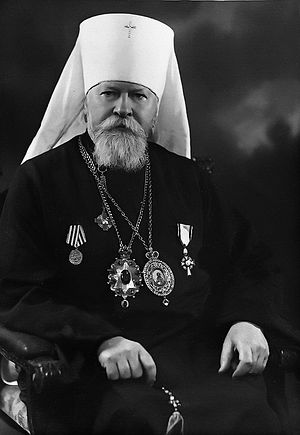 Metropolitan Bishop Nicholai (Yarushevich), There is such an illness, which is called “young-eldership”. Many have perhaps heard of such a thing? In my view it is already on the way out now, if I am not mistaken, because in modern days spiritual education has been more widely established. These days you cannot be ordained without a theological education. That is why I myself first graduated from the seminary in Leningrad, then from an academy in Moscow where I studied part-time. As I am a family man (I had wife and kids), I could not live in the seminary and study there, which is why I graduated after studying there part-time: first at the seminary and then at the academy.
Metropolitan Bishop Nicholai (Yarushevich), There is such an illness, which is called “young-eldership”. Many have perhaps heard of such a thing? In my view it is already on the way out now, if I am not mistaken, because in modern days spiritual education has been more widely established. These days you cannot be ordained without a theological education. That is why I myself first graduated from the seminary in Leningrad, then from an academy in Moscow where I studied part-time. As I am a family man (I had wife and kids), I could not live in the seminary and study there, which is why I graduated after studying there part-time: first at the seminary and then at the academy.
The illness of "young-eldership" is when a person hasn’t got any experience but is already trying to be a spiritual leader. This sick occurrence is on the way out, maybe it is almost gone altogether. Because if a person who needs leadership himself tries to lead others, not having the necessary knowledge—it is of course a very unpleasant occurrence. But now even the young bishops go through some kind of education, even for them there is some kind of education. And of course it is desirable for a bishop to have a secular education too. This a very important question. It is recommended because a seminary or an academy education on their own, of course, is not enough in order to have a breadth of views, etc.
I matured in the following way: My father worked in the religious sector beginning from, I believe, his military years. At first he worked at the newly-opened Theological University in Novo-Diveyevo Convent and on pastors' courses (where he organized a course of Russian religious thought), and then my father transferred to the editorial department of the Moscow Patriarchate and worked together with Metropolitan Nicholai (Yarushevich). As my father had philological education he was used to preparing and writing different missives, announcements… Many of his articles were saved by the Journal of Moscow Patriarchate. My father worked in this church sphere until his final years, when he was already old, a pensioner, and became almost complete enfeebled.
So I had the link to a religious education from the very beginning. But of course Theological University and pastors’ courses—those were my young years, I could not yet come and wholly take part in these classes because I was studying. So I just came for some events or gatherings… Sometime later, once I was ordained, I started studying part-time. Such was the rule—if a person gets ordained, then he must study part-time. So from 1958 I already began from time to time to go and sit my exams. I prepared for the exams at home and in order to pass them, first came to Leningrad and later to Moscow, to the academy. That is how I completed my education. I didn’t write any dissertations, from had an academic aversion to that; but I completed my education successfully, and passed all my exams.
That is, I fully passed the courses of both the theological academy and the seminary. Well, and of course I had my personal experience of communicating with my fathers-confessors. For example, associating with such a great hierarch of our Church as Metropolitan Anthony (Bloom). He was our common friend and influenced my life in a wonderful way—in every aspect: in giving sermons, in conversation, and in general he was a distinguished personality. It was pure happiness to have an opportunity to associate with such a person!
"Under-thinkers”
—You have heard many confessions—an enormous spiritual practice… What do you think, have your spiritual children changed somehow in recent times? What do they come to confess today? Which sins are the most frequent ones? How do people repent? Do people spiritually grow?
—I can of course talk only about those who are close to me. In a wider context it is hard to judge, because I only communicate with the spiritual children that have some type of relationship to me. And about them I can say that these are the people who generally stay on a spiritual path. Despite having different professions, they are being led in some way; that is, they have obedience.
I think the most important element in spiritual leadership is to have obedience to one’s father-confessor—that is to cut off one’s will. That is, the priest who tells you something during the confession says it not from himself, but from God! And so obedience to him—whether you like it or not, whether you want it or not, is necessary. So, I believe, I pay the most attention to this side. If there is no obedience—there is no meaning in the spiritual leadership.
—It seems to me that the spiritual mindset in a family forms the personality of a child brought up in that family. Is this true?
—I believe that the upbringing of children begins while child is yet inside his mother’s womb. Once conception has taken place. Let it be just a small cell inside it’s mother’s womb, but it’s already a future person with everything fitted in inside! A new person has already been created! The child is developing, and upbringing starts then. It depends on the state of the mother—her internal moral state. Does she fight off irritability? With her negative internal mood, all of it gets reflected in the nervous system of the child who already perceives everything. Let the parents not think that if a child is still in the womb he doesn’t feel anything. And when the child is born, his formation begins from the earliest age.
What is upbringing? It is not verbal teachings, but the condition of the family, the state of the parents. If they are in love with each other, if there is a favourable climate in their home, if they treat each other with love, then all of it gets reflected on the new person.
Mothers, you must treat what happened to you in the most responsible manner! You are responsible for a person’s destiny! You may damage the entire destiny of a new person if you behave yourself unworthily. It will all not only reflect on their soul, but on their nervous system too—on everything! You can completely damage the entire destiny of a person if you behave yourself unworthily! That happens often when mothers conduct themselves horribly or parents quarrel, etc.
—But today we unfortunately see young women walking with a pram or with a child in their arms and swearing, smoking a cigarette… What kind of person will be brought up by such a mother?
—Without a doubt, it’s a tragedy. Everything depends on the parents’ behavior. If they permit themselves to swear and behave in an unworthy manner, then they take upon themselves an enormous responsibility. If a person is an atheist, it is a different matter. The unbeliever thinks that everything ends in this earthly life, that he bears no responsibility: He dies—and everything is over. Unfortunately, I have met people who had such a worldview.
My wife had an uncle whom we all loved. He was a test pilot. It's a dangerous profession, as you can imagine, to test pilot planes. He lived to retirement, he had a dacha in Koktebel, and we often went there to relax; we really loved that uncle. And he had this view of life: “’There was an Uncle Volodya, and now there isn’t.’ And that’s it! Everything ends here. ‘I am not afraid of death: There was an Uncle Volodya and now there isn’t!’ Well this is it. There is nothing out there once I die. Everything will just end… I will turn into a ‘zero’, into nothing.”
I have seen this worldview in some people, even in scientists. I even knew one scientist… Through my spouse and through my mother-in-law I met such scientists as Michael Michaelovich Dubinin, an academician, and Pavel Feliksovich Zdradovksy… My mother-in-law was a microbiologist, a professor, and she held a higher Doctorate. Amongst my friends there had been another member-correspondent, Shmutov, a very likable person, but he used to say: “After death I will feel what I felt before birth!” Such was his worldview, do you understand? That there is nothing there! I died and I turned into a “zero”. Can you imagine that not only will you keep but a part of your consciousness, but in fact turn into a “zero”? I myself cannot imagine such a thing!
—But to this day scientists insist on the theory of evolution and the origin of a man from a monkey…
—People that think that way are “under-thinkers”; they just don’t understand anything in life. But when a certain situation happens to them, then they understand instantly what is really happening.
When they are fit and healthy, everything is seemingly okay. But there will come a moment, when something happens, like a stroke or a partial loss of consciousness or something else… God may send various lessons and that person might then sense that everything does not end here!
A lot has been written about these facts; for example in a book called, “Life after Death” and the like. I will not get into this now, but it is a very interesting topic—an area of the existence of human soul beyond the grave. There are many facts that evidence the life of the soul after a person’s death. There are such works as “Life after Death”, “The Human Phenomenon”…
So only “under-thinkers” close their eyes to this fact because it is easier to live that way, just to live—day after day. To be a decent person because it is convenient and comfortable, and what comes next—be it as it will… These “under-thinkers” have an indolent approach to life.

